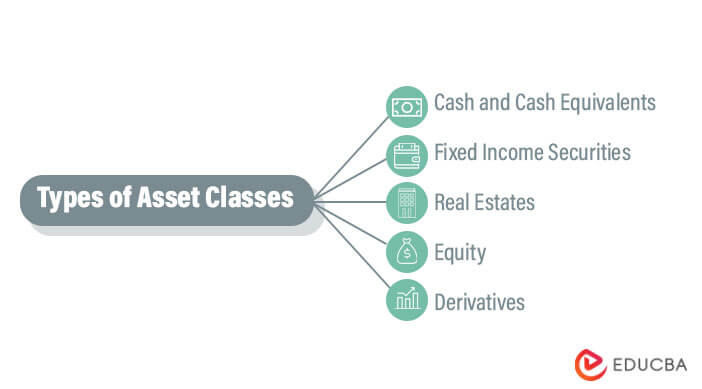Updated July 17, 2023

Introduction to Asset Classes
Asset classes are different categories of financial instruments or investment vehicles (such as cash & cash equivalents, real estate, derivatives, fixed assets, investment in equities, etc.), which are categorized based on similar financial characteristics of each group. The basis may include the purpose of holding the asset, returns generated from the asset, or any unique asset characteristic.
- The word “asset” means something of value or a useful thing. An asset is a resource with an economic value that any person owns or controls to receive a future economic benefit.
- Thus, asset classes are nothing but different categories of such resources.The intention is to create groups that keep similar assets together under one heading.
- The different classes of assets include investment into equity or equity-linked saving schemes, alternative investments, real estate, fixed assets, cash & cash equivalents, etc.
- Each asset class has its own objective, advantage & disadvantage.
- Is there any correlation between the different classes of assets? The answer is not necessary. In some cases, there is a negative correlation between the classes.
- The different classes are basically made for easy identification & observation. Each has a different purpose.
Types of Asset Classes
The most famous asset classes are discussed as follows:
1. Cash and Cash Equivalents
- Cash means hard cash. Cash equivalents mean bank balance & highly liquid bank deposits, which mature within 3 months from the reporting date. All such terms are collectively called cash & cash equivalents.
- Cash serves the purpose of immediate liquidity.
- The resource is easily accessible at the time of need.
2. Fixed Income Securities
- Here the investor expects fixed returns on the debt amount infused.
- The agreement fixes the tenure of the fixed interest payment along with principal repayment.
- Say, there is a 5-year bond with a 7% coupon rate. The company will pay you 7% per annum on the face value of the bond until 5 years. You will receive your principal amount at the end of the 5th year.
- Are coupons paid annually? The answer is not necessary. Some companies have quarterly or monthly, or semi-annual frequencies of paying the interest amount.
- Since the returns are fixed & carry a lower level of risk, the returns are close to bank fixed deposit interests. Every return has a correlation with its associated risk. Thus, lower risk implies a lower return.
3. Real Estate
- As the name implies, it is the real asset of anyone who owns it. The reason is that owning real estate will also flourish you with “n” of opportunities in terms of returns, holding value, opportunity returns, status symbol, etc.
- Real estate ensures providing capital gains multiples times the investment value.
- On the benefits front, accounting norms permit claiming depreciation costs as expenses in books of account. However, the market value goes on to increase with the time factor.
- Compared to other asset classes, only real estate is visible to the naked eye due to its tangible feature. The majority of other classes of assets are financial instruments with intangible characteristics. That’s why banks easily provide finance to companies with higher tangible assets.
4. Equity
- Equity basically means having a share of ownership in the company.
- Public companies issue equity shares against the consideration received for investment.
- Shareholders are said to be owners of the entity. Thus, in the event of a company’s liquidation, the outside liabilities prioritizes for payment.
The equity holders are paid at the end of any asset left with the company. - If it is so, why do people invest in equities? The reason is simple. If you are an owner, you are eligible for enormous & extensive profit earned by the company. The returns are not in percentages but in multiple times the investment made.
- Risk & return go hand in hand. Since equities have the opportunity to return, it is flooded with a similar quantum of risks. Risk includes the business risk carried by the company.
- The equities market is further divided into small-caps, mid-caps & large-caps depending on market capitalization size.
5. Derivatives
- A derivative is a financial instrument that derives value from an underlying asset. A change in the value of such an underlying asset automatically changes the value of the derivative instrument.
- Derivative instruments are the most volatile holdings in the world. It has a considerably high range of gain or loss value.
- Derivatives help remove the uncertainty over prices & help the investor to gain from the uncertainties.
- A strike price is fixed at the time of the contract.
Importance of Asset Classes
- Management of different classes of assets is important for companies looking into future expansions.
- One side of the balance sheet is equity & liabilities. The other side of the balance sheet is assets. Thus, the company’s capital structure reflects the assets owned by the entity.
- Each asset class has its own importance in the corporate world.
- The cash & cash equivalents provide immediate liquidity whenever the company needs it. Due to its every-time availability feature, it has no return.
- Investment in equities serves as a financing need of a company when it wants to take a loan by keeping such investments as collateral with the lender. Without such assets, the company would not have received easy approvals of loans.
- Derivatives are important for trading in the market in the hope of gaining from the price fluctuations of the underlying asset.
- Fixed-income securities offer assurance about the company’s minimum cash inflow. On maturity, the company receives the same or higher amount of investment.
- Real estate shows the existence of the company. Real estate includes factory buildings, leasehold improvements, freehold land, etc. Each real estate has an opportunity to gain for holding the same.
- As you can see from the above discussion, one may easily conclude that each asset class has its own different importance in the finance world.
Advantages of Asset Classes
Let’s discuss the advantages of each class of asset one by one.
Cash & Cash Equivalents
- Readily available every time whenever the owner needs it.
- This ready cash is always helpful in case of downturns (like COVID-19).
- Analysts always appreciate a medium quantum of cash & cash equivalent.
- This is temporary parking of excess funds till the company decides on its further investment plan.
Fixed Income Securities
- The fixed inflow of cash even if the economy is sliding down.
- Since an agreement has already been made, the borrower has to pay the same interest rate even if interest rates have fallen in the market.
- The income component is always predictable.
- It is safer than investments in equities since it carries a lower level of risk.
- It is also considered a tool for the diversification of a portfolio & it balances the total portfolio of an investor.
Real Estate
- The market value increases. Thus, the government does not tax the unrealized gain until the asset is sold.
- Very high returns when sold at the right time.
- It is one of the safest investments after fixed-income securities.
- Holding real estate also provides rental income to the holder.
Investment in Equity
- The returns are always astonishing.
- The investment can be easily sold in the stock market.
- Equity offers the right to vote in a general meeting. Votes are linked to the number of stocks held by a person.
- Returns are higher than fixed-income securities.
- Less complicated to sell than selling real estate.
- It provides an opportunity to earn dividend income.
Derivatives
- It has a high earning potential.
- It provides an opportunity to earn higher in a shorter span of time.
Disadvantages of Asset Classes
On the other side of the story, let’s discuss the disadvantages of asset classes individually.
Cash & Cash Equivalents
- Zero rates of interest for holding cash in hand.
- The rate of interest for a very short-term period is never attractive. The opportunity cost of not holding the required cash is high sometimes.
- Too high or too low cash is always dangerous.
- Too high a cash balance implies the inability of the company to park the money at attaining gains.
- It does not protect from inflations.
- Too low a cash balance implies lower liquidity.
Fixed Income Securities
- Lower flexibility to exit in case of rates in the market has risen.
- Lower return than equity.
- The stream of cash flows is very slow. There is no growth aspect in the rate of interest.
- The rate is interesting and cannot be revised.
Real Estates
- These are held for the long term. The value diminishes in the books of accounts.
- Books of account do not allow to revalue as per the market value.
- Money is stuck for a longer period of time.
- In case real estate is sold, companies’ shareholders always question the stand taken by management. Thus, earning capital gain is not that easy.
Investment in Equities
- Most volatile investment.
- You may have to wait for years in case your chosen stock does not have sound fundamentals.
- Capital gains are subject to separate taxation at a distinct interest rate regardless of marginal tax rates.
- The dividend income is not attractive.
Derivatives
- Returns are volatile in nature.
- High return associates with high risk.
- In most cases, the premium is absorbed by the time of the expiry period.
- Prices are very much dependent on the flow of the economy.
Conclusion
The percentage of investment in one asset class has implications on the overall return you will earn in the near future. Thus, diversification is always at the center of discussion for every finance-oriented topic. The risk cannot be eliminated but can be reduced to a very low only by diversifying investment into different categories. Risk means the chances of not earning a profit or losing the whole investment. Every risk has a considerable return. Thus, classifying assets into appropriate categories helps the reader understand the diversification of the entity.
Recommended Articles
This is a guide to Asset Classes. Here we discuss the introduction, types of asset classes, and advantages and disadvantages. You may also have a look at the following articles to learn more –


